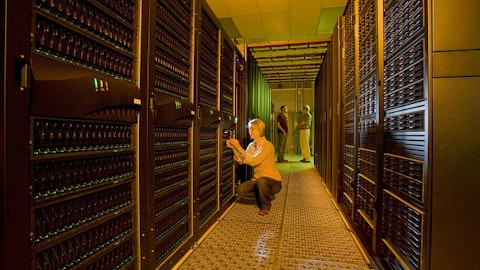But I do think that, there will still have to be some investments to make, and there will also be opportunities to go save cost with some of the new products that we have coming. And we’ve also been through the cycle on the early side already of already the inventories being depleted around the world. So, there’s not that massive inventory bubble out there anymore.
Steven Fox: Thanks for that. That’s interesting color. And then, Gianluca, can you just, I mean, I assume you don’t want to give like specific underutilization charges likely for the first half of next year. But can you sort of directionally give us a sense for how long you think we should keep modeling even if there’s smaller charges, in calendar Q1 and Q2 keep that in there gross margin calculations. Thanks.
Gianluca Romano: Yeah. We expect to have a underutilization cost also in calendar Q1 and calendar Q2. Probably little bit, could be lower than what we have in December, of course, but, of course, the volume that we are producing is still little bit below what we had installed in at the top of the cycle before.
Steven Fox: Great. That’s helpful. Thank you.
Operator: The next question comes from Ananda Baruah of Loop Capital. Please go ahead.
Ananda Baruah: Yeah. Thanks, guys. Good morning. Thanks for taking the question. I guess, Dave, just given that you’re starting to see things start to firm up, and talking about I think, Gianluca, q-over-q increases, in Nearline as you go through 2024, what’s the opportunity, Dave, for things to get tight as you go through 2024 just given the capacity that you’ve taken offline?
Dave Mosley: Well, I think that tightness is actually kind of interesting because, like we said before, the data is growing in the data centers. We all know that. You know the amount of data being generated is growing quite quickly. And I think relative to the hard drive industry, quickly reacting to anything right now because of some of the damage been done in the supply chain and just some of the, frankly, the lead times that exist on current parts, especially at the highest capacity points, there’s not as much flex as there used to be. And so I think, we may see — we may enter into an environment where people say, okay, I see the economics of upgrading part of my fleet here now. Let’s go ahead and do it. It’ll save me power.
It’ll save me space. It’ll allow me to answer the call for the data that’s growing. And then once they get their orders in, we’ll say, well, the lead time is x and that might be the challenge. So that’s how I think things may get tight and it’ll manifest itself. I don’t know exactly when, but I certainly think that we could get into a situation like that just simply because the hard drive industry does not have the immediate capacity games that it used to.
Ananda Baruah: And then what is that — so what are the downstream impacts of that? I mean, in the past, it’s been pricing goes up, long term agreement, that type of deal. Is that still some of the stuff that could occur that you find —
Dave Mosley: That’s right. But that’s exactly why we’re addressing the customer base with these built to order models, because we — I think we’re in some sense, we’re helping the customers get a predictable financial outcome and if they can give us at least some predictable visibility.
Ananda Baruah: That’s super helpful. Thanks. I’ll keep it there guys. Thanks.
Operator: The next question comes from Mark Miller of The Benchmark Company. Please go ahead.
Mark Miller: Thank you for the question. You mentioned AI opportunities in via cameras and other areas. I’m just wondering, when you think these opportunities will really start to ramp and any idea on the magnitude of these opportunities in terms of sales for next year?
Dave Mosley: Yeah, Mark. I think it’s really hard to quantify just yet, but there’s a lot of stuff going on in, I’ll say big data around AI. You know, you’ve got people pointing Chief Data Officers now to be able to track where is the data, what’s its value, might we want to retain that just in case that we end up with some tools that are allowing us to monetize it or understand more about our processes, so on and so forth with customer base, factories. So my personal opinion is we’re in the early innings of a move from throwing data away to keeping some of it longer term for the benefits of the corporations. And I do think that a lot of that will be edge. I don’t think all of it will end up in a cloud. I think a lot of it will actually be on the edge.
And so this is something we were tracking very carefully. I don’t think it’s really manifested itself just yet. I think people are using some of the new application capabilities, that are being branded AI applications. To get to know them and understand them. And I certainly, like things like generative AI, which I believe is kind of a new user interface, if you will, that will allow the applications to be used much more efficiently and maybe queries to be made of these applications much more efficiently, but I think we’re still in the early innings. And I think once it does latch, we’re going to know that data and the longevity of that data and the integrity of that data is all critical. And so I think that’s good for us.
Mark Miller: You mentioned lower CapEx for fiscal 2024. Can you give us a range or any idea on what would it be?
Dave Mosley: I think we’ll probably stay inside of our existing range, 4% to 6% of revenue. But we are — since the revenue is so far down, we are very mindful of the spending. However, we can see the tools that we need to bring HAMR up according to a certain pace. And as soon as if the pace is quickens we will get there as quickly as we possibly can. So, we understand what the recipe is and we understand what’s needed to make a recipe really well, and we’ll spend accordingly.
Mark Miller: Thank you.
Operator: The last question will come from Vijay Rakesh of Mizuho. Please go ahead.
Vijay Rakesh: Yeah. Hi, guys. Just, quickly on the HAMR side. I was just wondering, when you look at, exiting 2024, what your mix of HAMR would be either by exabyte or units?





